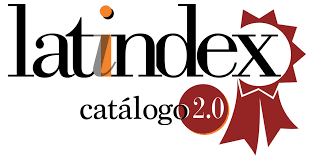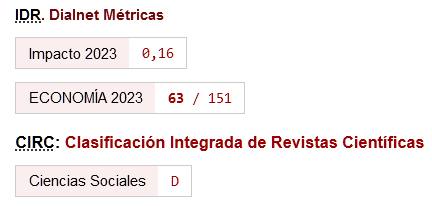Procesos y transformaciones en el contexto de la 4ª Revolución Industrial que impulsen entornos igualitarios y saludables.
DOI:
https://doi.org/10.46661/rec.10533Palabras clave:
Trabajo, género, entorno saludable, cuidadoResumen
La 4ª revolución industrial enfrenta diversos retos relacionados con la diversidad de la fuerza laboral y cambios sustanciales en sus estilos de vida, la necesidad de gestionar crisis sucesivas, y aumentar la digitalización como dinámica global competitiva. Todo ello sostenido sobre una ética del trabajo orientada al éxito profesional, y centrado en una visión androcéntrica del trabajo, resultado de una división del trabajo sexualizado. En este trabajo analizamos las tendencias identificadas en España y Europa respecto al mercado laboral, la salud y el bienestar, así como las relaciones laborales en las organizaciones. De este modo, tratamos de arrojar luz sobre las transformaciones necesarias para evitar desajustes de género, que caracterizan actualmente el mercado laboral y las sociedades española y europea. En este sentido, proponemos qué dirección deberían tomar las organizaciones y políticas públicas con el objetivo de promover entornos más saludables, considerando una perspectiva de género y de los cuidados.
Descargas
Citas
Acker, Joan (2009): "From glass ceiling to inequality regimes", Sociologie du Travail 51(2), pp. 199-217.
https://doi.org/10.1016/j.soctra.2009.03.004 DOI: https://doi.org/10.1016/j.soctra.2009.03.004
Acker, Joan (2012): "Gendered organizations and intersectionality: problems and possibilities", Equality, Diversity and Inclusion: An International Journal 31(3), pp. 214-224.
https://doi.org/10.1108/02610151211209072 DOI: https://doi.org/10.1108/02610151211209072
Berg, Janine, Furrer, Marianne, Harmon, Ellie, Rani, Uma y Silberman, M. Six (2018): Digital labour platforms and the future of work: Towards decent work in the online world. ILO.
Blau, Francine y Kahn, Lauren (2000): "Gender Differences in Pay", Journal of Economic Perspectives 14, pp. 75-99.
https://doi.org/10.1257/jep.14.4.75 DOI: https://doi.org/10.1257/jep.14.4.75
Brussevich, Mariya; Dabla-Norris, Era; Kamunge, Christine; Karnane, Pooja; Khalid, Salma y Kochhar, Kalpana (2018): Gender, Technology, and the Future of Work, IMD Staff Discussion note. Disponible en: https://www.imf.org/en/Publications/Staff-Discussion-Notes/Issues/2018/10/09/Gender-Technology-and-the-Future-of-Work-46236. Consultado el 21 de abril de 2021.
Chung, Heejung y Tijdens, Kea (2013): "Working time flexibility components and working time regimes in Europe: using company-level data across 21 countries" The International Journal of Human Resource Management, 24(7), pp. 1418-1434.
https://doi.org/10.1080/09585192.2012.712544 DOI: https://doi.org/10.1080/09585192.2012.712544
Comisión Europea (2020): Telework in the EU before and after the COVID-19: where we were, where we head to, Science For Policy Brief, Joint Research Center.
De la Rica, Sara; Dolado, Juan J. y Llorens, Vanesa (2008): "Ceilings or Floors? Gender Wage Gaps by Education in Spain", Journal of Population Economics 21, pp. 751-76.
https://doi.org/10.1007/s00148-006-0128-1 DOI: https://doi.org/10.1007/s00148-006-0128-1
Di Fabio, AnnaMaria (2017): "The psychology of sustainability and sustainable development for well-being in organizations" Frontiers in psychology, 8, nº1534.
https://doi.org/10.3389/fpsyg.2017.01534 DOI: https://doi.org/10.3389/fpsyg.2017.01534
Delgado, Leticia M. (2014): "La promoción de la igualdad de género española", Investigaciones Feministas 5, pp. 232-258.
https://doi.org/10.5209/rev_INFE.2014.v5.47761 DOI: https://doi.org/10.5209/rev_INFE.2014.v5.47761
Eurofound (2020): Women and labour market equality: Has COVID-19 rolled back recent gains?, Publications Office of the European Union, Luxembourg. Disponible en: https://www.eurofound.europa.eu/sites/default/files/ef_publication/field_ef_document/ef20068en.pdf. Consultado el 21 de abril de 2021.
Eurofound (2017): Working time patterns for sustainable work, Publications Office of the European Union, Luxembourg. Disponible en: https://www.eurofound.europa.eu/sites/default/files/ef_publication/field_ef_document/ef1720en.pdf. Consultado el 21 de abril de 2021.
Eurofound e ILO (2017): Working anytime, anywhere: The effects on the world of work, Publications Office of the European Union, Luxembourg, and the International Labour Office, Geneva.
Fana, M., Tolan, S., Torrejón, S., Urzi Brancati, C. y Fernández-Macías, E. (2020): The COVID confinement measures and EU labour markets, EUR 30190 EN. Publications Office of the European Union, Luxembourg, doi:10.2760/079230, JRC120578. Disponible en: https://ec.europa.eu/jrc/en/publication/covidconfinement-measures-and-eu-labour-markets. Consultado el 21 de abril de 2021.
Fernández Avilés, José Antonio (2017): "NTIC y riesgos psicosociales en el trabajo: estado de situación y propuestas de mejora", Diritto della Sicurezza sul Lavoro 2, pp. 69-101.
Fuchs, Christian y Sevignani, Sebastian (2013): "What is digital labour? What is digital work? What's their difference? and why do these questions matter for understanding social media?" tripleC: Communication, Capitalism and Critique 11(2), pp. 237-293. DOI: https://doi.org/10.31269/triplec.v11i2.461
https://doi.org/10.31269/vol11iss2pp237-293 DOI: https://doi.org/10.31269/vol11iss2pp237-293
Gálvez, Lina y Rodríguez-Modroño, Paula (2012): "La desigualdad de género en las crisis económicas", Investigaciones Feministas 2, pp. 113-132.
González Ramos, Ana M. (2020a): "Las empresas competitivas que cuentan con entornos inclusivos y respetuosos", Oikonomics 13, pp. 1-11.
https://doi.org/10.7238/o.n13.2005 DOI: https://doi.org/10.7238/o.n13.2005
González Ramos, Ana M. (2020b): "Digital Communication Tools for Fostering Career Advancement and Sustaining Interpersonal Relationships", Sociological Research Online 25 (2), pp. 184-200.
https://doi.org/10.1177/1360780419861649 DOI: https://doi.org/10.1177/1360780419861649
Aquí están las citas bibliográficas sin asteriscos ni DOI:
González Ramos, Ana M. y Vergés Bosch, Núria (2013): "International mobility of women in science and technology careers: Shaping plans for personal and professional purposes", Gender, Place and Culture 20(5), pp. 613–629. DOI: https://doi.org/10.1080/0966369X.2012.701198
Grawitch, Matthew J., Gottschalk, Melanie y Munz, David C. (2006): "The path to a healthy workplace: A critical review linking healthy workplace practices, employee well-being, and organizational improvements", Consulting Psychology Journal: Practice and Research 58, pp. 129–147. DOI: https://doi.org/10.1037/1065-9293.58.3.129
Hakim, Catherine (2000): Work-lifestyle choices in the 21st century, Oxford University Press. DOI: https://doi.org/10.1093/oso/9780199242092.001.0001
Huws, Ursula, Spencer, Neil H., Coates, Matthew y Holts, Kaire (2019): The Platformisation of Work in Europe. Highlights from Research in 13 European countries. Disponible en: https://www.feps-europe.eu/resources/publications/686-the-platformisation-of-work-in-europe.html. Consultado el 21 de abril de 2021.
INE
Jolanki, Outi (2015): "To work or to care? Working women's decision-making", Community, Work & Family 18(3), pp. 268–283. DOI: https://doi.org/10.1080/13668803.2014.997194
Kossek, Ellen, Kalliath, Thomas y Kalliath, Parveen (2012): "Achieving employee wellbeing in a changing work environment: An expert commentary on current scholarship International", Journal of Manpower 33(7), pp. 738-753. DOI: https://doi.org/10.1108/01437721211268294
Lamolla, Laura y González Ramos, Ana M. (2019): "Mujeres en el sector de las tecnologías, ¿cuestión de competencias?", Revista Española de Sociología 28 (3, supl. 2), pp. 79-98. DOI: https://doi.org/10.22325/fes/res.2019.39
Lamolla, Laura y González Ramos, Ana M. (2020): "Tick-tock sounds different for women working in IT areas", Community, Work & Family 23(2), pp. 125-140. DOI: https://doi.org/10.1080/13668803.2018.1483321
Lyon, Dawn y Woodward, Alison (2004): "Gender and time at the top: Cultural construction of time in high-level careers and homes", European Journal of Women's Studies 11(2), pp. 205–221. DOI: https://doi.org/10.1177/1350506804042096
Lombardo, Emanuela y León, Margarita (2015): "Políticas de igualdad de género y sociales en España: origen, desarrollo y desmantelamiento en un contexto de crisis económica", Investigaciones Feministas 5, pp. 13-35. DOI: https://doi.org/10.5209/rev_INFE.2014.v5.47986
Lorey, Isabell (2014): State of Insecurity: Government of the Precarious, Verso Futures
Lowe, Graham S (2010): Healthy Organizations: How Vibrant Workplaces Inspire Employees to Achieve Sustainable Success. Toronto, ON: University of Toronto Press.
Manzano, Noemí (2018): "Las Tecnologías de la Información y la Comunicación (TIC) (I): nuevas formas de organización del trabajo", Notas técnicas de prevención 1.122 Disponible en: https://www.insst.es/documents/94886/566858/ntp-1122w.pdf/baa93260-6840-4b9b-9abb-b6980b7f8f71. Consultado el 21 de abril de 2021.
Méda, Dominique (2019): "Three scenarios for the future of work", International Labour Review 158(4), pp. 627-652. DOI: https://doi.org/10.1111/ilr.12157
Moen, Phyllis, Pedtke, Joseph H y Flood, Sarah (2020): "Disparate Disruptions: Intersectional COVID-19 Employment Effects by Age, Gender, Education, and Race/Ethnicity", Work, Aging & Retirement 6 (4) pp. 207-228. DOI: https://doi.org/10.1093/workar/waaa013
OIT (2016): Women at Work. Trends 2016 OIT: Geneva.
OIT (2018): Global Wage Report 2018 / 19. What lies behind gender pay gaps OIT: Geneve.
OMS (2010): Entornos Laborales Saludables: Fundamentos y Modelo de la OMS. OMS: Geneve. Disponible en: https://www.who.int/occupational_health/evelyn_hwp_spanish.pdf. Consultado el 21 de abril de 2021.
OMS (2020): Where do we stand on women's health in 2020? 06-03-2020. Disponible en: https://www.euro.who.int/en/health-topics/health-determinants/gender/news/news/2020/3/where-do-we-stand-onwomens-health-in-2020. Consultado el 23 de octubre de 2020.
Özkazanç-Pan, Banu y Pullen, Alison (2020): "Gendered labour and work, even in pandemic times" Gender, Work, and Organization 27 (5) pp. 675-676
https://doi.org/10.1111/gwao.12516 DOI: https://doi.org/10.1111/gwao.12516
Reskin, Barbara y Roos, Patricia A. (1990): Job queues, gender queues. Women's into male occupations, Temple University.
Rubery, Jill (1988): Women and Recession, Routledge & Kegan Paul.
Rubery, Jill y Koukiadaki, Aristea (2016): Closing the gender pay gap: A review of the issues, policy mechanisms and international evidence, ILO. Disponible en: http://www.oit.org/wcmsp5/groups/public/---dgreports/---gender/documents/publication/wcms_540889.pdf. Consultado el 21 de abril de 2021.
Servoz, Michel (2019): The future of work? Work of the Future! On how artificial intelligence, robotics and automation are transforming Jobs and the economy in Europe. AI Report, disponible en: https://op.europa.eu/en/publication-detail/-/publication/096526d7-17d8-11ea-8c1f-01aa75ed71a1. Consultado el 21 de abril de 2021.
Signorelli, Marcello, Choudhry, Misbah y Marelli, Enrico (2012): "The Impact of Financial Crises on Female Labour", European Journal of Development Research 24(3), 413-433.
https://doi.org/10.1057/ejdr.2012.3 DOI: https://doi.org/10.1057/ejdr.2012.3
Sweet, Stephen, Sarkisian, Natalia, Matz-Costa, Christine y Pitt-Catsouphes, Marcie (2016): "Are women less career centric than men? Structure, culture, and identity investments", Community, Work & Family 19(4), pp. 481-500.
https://doi.org/10.1080/13668803.2015.1078287 DOI: https://doi.org/10.1080/13668803.2015.1078287
Tomlinson, Jennifer, Baird, Marian, Berg, Peter y Cooper, Rae (2018): "Flexible careers across the life course: Advancing theory, research and practice" Human Relations, 71(1), 4-22.
https://doi.org/10.1177/0018726717733313 DOI: https://doi.org/10.1177/0018726717733313
Descargas
Publicado
Cómo citar
Número
Sección
Licencia
Derechos de autor 2021 Ana María González Ramos, Laura Lamolla

Esta obra está bajo una licencia internacional Creative Commons Atribución 4.0.
Esta licencia permite a terceros compartir (copiar y redistribuir el material en cualquier medio o formato) y adaptar (remezclar, transformar y crear a partir del material para cualquier finalidad, incluso comercial), siempre que se reconozca la autoría y la primera publicación en esta revista (La Revista, DOI de la obra), se proporcione un enlace a la licencia y se indique si se han realizado cambios en la obra.







